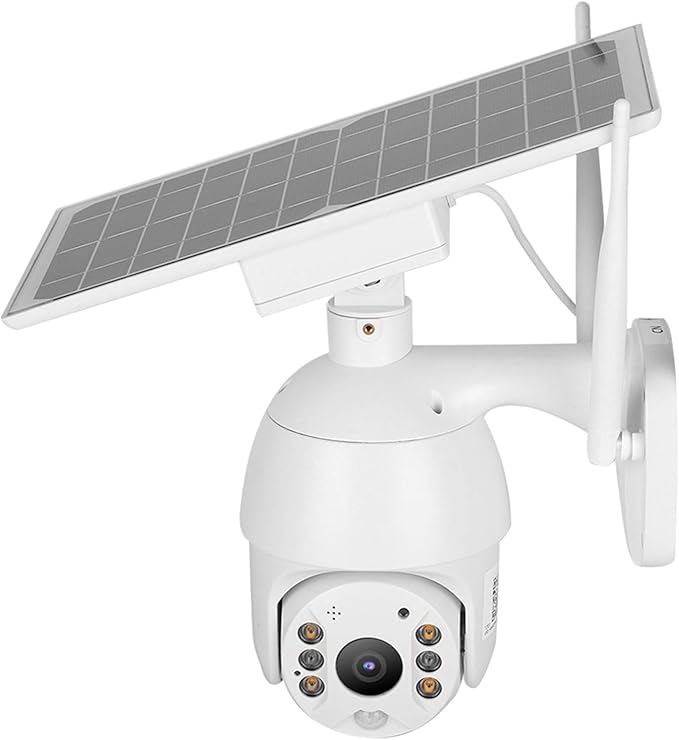The allure of a completely wire-free, solar-powered security camera is undeniable. But a nagging question often pops up: do these cameras actually work at night? The simple answer is: it depends. While the sun’s energy powers the camera during the day, nighttime functionality hinges on several key factors. Let’s delve into the details to help you understand what to expect from a solar security camera in low-light conditions.
Understanding Night Vision Technology in Solar Cameras

Most solar cameras rely on infrared (IR) technology for night vision. Unlike traditional visible light, IR light is invisible to the human eye but can be detected by specialized sensors. The camera’s IR LEDs emit this infrared light, illuminating the scene, allowing the camera’s sensor to capture images even in complete darkness. The quality of this night vision is crucial and varies significantly across different camera models.
Types of Infrared Night Vision
There are several variations of IR night vision technology to be aware of:
- Passive Infrared (PIR): PIR sensors detect the heat signatures of moving objects. This isn’t strictly “night vision” in the sense of providing an image, but it’s a common feature used to trigger recordings or alerts when motion is detected at night.
- Active Infrared (AIR): This is the more common type in solar cameras. It uses IR LEDs to actively illuminate the area, providing clear black and white video footage in the dark. The range and intensity of these LEDs determine the quality of the night vision.
- Full-Color Night Vision: Some higher-end solar cameras offer full-color night vision. This utilizes advanced image sensors and processing to capture color information even in low-light situations, often by augmenting the low available light with some form of IR assist.
Factors Affecting Nighttime Performance
The effectiveness of a solar camera’s night vision is influenced by several factors:
- IR LED Power and Range: The number and power of the IR LEDs directly impact the effective range of night vision. More powerful LEDs illuminate a larger area, resulting in clearer images at greater distances. Check the camera’s specifications for details on IR range.
- Image Sensor Sensitivity: The camera’s image sensor plays a critical role. A more sensitive sensor can capture more light, even in low-light conditions, resulting in better-quality images. Look for cameras with high-sensitivity sensors.
- Lens Aperture: A wider aperture (lower f-stop number) allows more light to reach the sensor, enhancing nighttime performance. This is often overlooked but is a crucial factor in low-light image quality.
- Environmental Factors: External factors such as ambient light, weather conditions (fog, rain), and the presence of other light sources can all affect night vision. Heavy fog, for instance, can significantly reduce the effectiveness of IR LEDs.
- Solar Panel Efficiency & Battery Capacity: Although this might seem unrelated to night vision, a poorly performing solar panel or a small battery can lead to power outages at night, rendering the night vision useless. Ensure the solar panel is appropriately sized for your location and climate and that the battery has sufficient capacity to power the camera through the night.
Comparing Solar Cameras: Night Vision Capabilities

When comparing solar cameras, it’s vital to pay attention to their night vision specifications. Look for cameras that explicitly mention their IR range, sensor sensitivity, and any special features like full-color night vision. Reviews from other users can be invaluable in understanding real-world performance in various lighting conditions.
Don’t just focus on marketing hype. Look for verifiable details. Claims of “amazing night vision” mean little without concrete specifications. A well-regarded brand with transparent specifications and positive user reviews is generally a safer bet.
Practical Tips for Optimizing Night Vision

To get the best possible nighttime performance from your solar camera, consider these tips:
- Optimal Placement: Position the camera in a location that minimizes obstructions and maximizes IR illumination. Avoid placing the camera where shadows or other objects might block the IR light.
- Regular Cleaning: Dust and dirt can accumulate on the camera’s lens and reduce its effectiveness. Regularly clean the lens to ensure optimal image quality.
- Adjusting IR Settings (if available): Some cameras offer adjustable IR settings. Experiment to find the optimal setting for your environment.
- Consider Supplemental Lighting: If you are struggling with truly dark areas, consider adding low-level motion-activated lighting to supplement the IR illumination.
Conclusion: Making an Informed Decision

While solar cameras may not offer the same crystal-clear nighttime images as high-end wired cameras with powerful IR illumination, many provide surprisingly good performance, especially in areas with some ambient light. By understanding the technology involved, considering the factors affecting night vision, and choosing a camera with appropriate specifications, you can find a solar camera that meets your security needs even in low-light conditions. Don’t hesitate to thoroughly research specific models and read user reviews before making a purchase to ensure you find the best fit for your situation.


